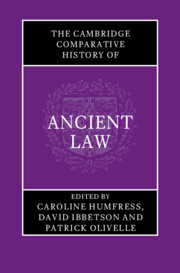Book contents
- The Cambridge Comparative History of Ancient Law
- The Cambridge Comparative History of Ancient Law
- Copyright page
- Contents
- Figures
- Maps
- Contributors
- Preface
- Additional material
- Additional material
- Abbreviations
- Maps
- 1 Orientation
- 2 Law as Text
- 3 Legal Science
- 4 War, Peace and Interstate Relations
- 5 Law and the State
- 6 Law and Religion
- 7 Legal Procedure
- 8 Status and Family
- 9 Crime, Redress and Social Control
- 10 Property
- 11 Commerce and Contracts
- 12 Conclusion
- Bibliography
- Index
3 - Legal Science
Published online by Cambridge University Press: 09 May 2024
- The Cambridge Comparative History of Ancient Law
- The Cambridge Comparative History of Ancient Law
- Copyright page
- Contents
- Figures
- Maps
- Contributors
- Preface
- Additional material
- Additional material
- Abbreviations
- Maps
- 1 Orientation
- 2 Law as Text
- 3 Legal Science
- 4 War, Peace and Interstate Relations
- 5 Law and the State
- 6 Law and Religion
- 7 Legal Procedure
- 8 Status and Family
- 9 Crime, Redress and Social Control
- 10 Property
- 11 Commerce and Contracts
- 12 Conclusion
- Bibliography
- Index
Summary
This chapter seeks to understand ‘legal science’ from the internal point of view of each tradition and society, in order to avoid a conception too heavily influenced by contemporary views. To do so, reference is made both to the set of activities carried out by ‘legal experts’ in the whole domain of law (legislation, adjudication, legal counseling and education), and to the legal experts themselves, as far as they were regarded as such by their own societies. This approach requires first to establish the extent to which, in each society under consideration, knowledge of law was considered as autonomous knowledge. A sociological perspective is then adopted, identifying who in each society were considered legal experts, i.e. persons deemed to possess the legal knowledge to such a degree that it characterized their social position and/or function. The chapter then proceeds in a progressively more content-oriented manner towards a comparative description of legal science, focusing on how legal training took place in each society under consideration and in what literary forms the legal experts expressed themselves, to finally arrive at the core question, namely the description of the respective forms of legal reasoning.
Information
- Type
- Chapter
- Information
- The Cambridge Comparative History of Ancient Law , pp. 73 - 145Publisher: Cambridge University PressPrint publication year: 2024
